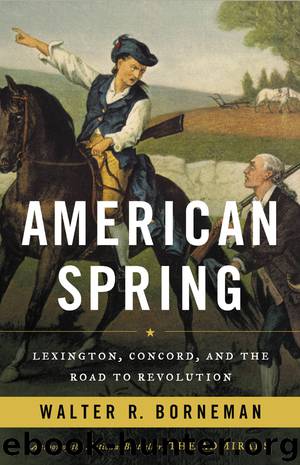American Spring: Lexington, Concord, and the Road to Revolution by Walter R. Borneman

Author:Walter R. Borneman
Language: eng
Format: epub
Tags: History / United States / Revolutionary Period (1775-1800), History / Military / United States, History / Modern / 18th Century, History / Revolutionary
Publisher: Little, Brown and Company
Published: 2014-05-05T16:00:00+00:00
Chapter 16
Spreading the News
As uncertain and confused as things were on the rebel side in the first few weeks after April 19, rebel leaders recognized the importance of spreading the news of what had occurred at Lexington and Concord and putting a decidedly pro-rebel spin on it. There was no equivocation. The rebel story line was short and concise: British regulars had marched out of Boston in the dead of night and without provocation attacked well-intentioned, defensive militia. It needed to be told as quickly as possible.
Postal riders carried dispatches that came to be called the Lexington Alarm throughout Massachusetts and into neighboring New Hampshire, Connecticut, and Rhode Island almost before Lord Percy’s brigade reached the relative safety of Charlestown. One such rider was Isaac Bissell, a twenty-seven-year-old post rider from Suffield, Connecticut. Bissell’s regular route was along the Upper Post Road, which led directly west from Boston to Worcester and Springfield and then south to Hartford, Connecticut. This route was connected to the Lower Post Road, which ran along the coast, and the Middle Post Road, which ran in between them, by lesser north-south roads. These roads formed the infrastructure of a sophisticated communications network—compliments of Ben Franklin’s efforts years before—that tied the colonies together and facilitated relatively speedy delivery of “express” messages.
Colonel Smith’s detachment of regulars was still maneuvering about Concord and the North Bridge when Joseph Palmer of the committee of safety, meeting on the run that day, handed Isaac Bissell a message for points south. It was dated “Wednesday Morning near 11 O’clock” on April 19 and addressed “To all friends of American liberty.” Recounting what was then known about the British march on Lexington and Percy’s advance with reinforcements, it noted Bissell’s charge “to alarm the country quite to Connecticut” and asked all persons to assist him with fresh horses.1
Standard procedure called for these express circulars to be copied upon receipt and the copy endorsed by one or more members of the local committee of correspondence before the copy was sent on its way with the rider to the next town. This had several purposes. Multiple copies allowed the news to spread out from the post roads, and the names of the endorsers gave some measure of credibility as well as a chain of custody to the report when it arrived in the next town. The downside was that continued copying frequently introduced misspellings and other errors that were not in the original.
Isaac Bissell galloped into Worcester later that afternoon of April 19 and came to the proverbial fork in the road: the Upper Post Road, his usual route, led west toward Springfield; another road ran south toward New London, Connecticut, after crossing the Middle Post Road at Pomfret. Subsequent stories to the contrary, Isaac Bissell did not detour from his usual route. After copies of the dispatch were duly made and attested to by Nathan Baldwin, Worcester’s town clerk, Bissell continued westward to complete his charge “to alarm the country quite to Connecticut.”
But the
Download
This site does not store any files on its server. We only index and link to content provided by other sites. Please contact the content providers to delete copyright contents if any and email us, we'll remove relevant links or contents immediately.
| African Americans | Civil War |
| Colonial Period | Immigrants |
| Revolution & Founding | State & Local |
Cat's cradle by Kurt Vonnegut(13895)
Pimp by Iceberg Slim(12946)
Underground: A Human History of the Worlds Beneath Our Feet by Will Hunt(11266)
4 3 2 1: A Novel by Paul Auster(11074)
The Radium Girls by Kate Moore(10915)
American History Stories, Volume III (Yesterday's Classics) by Pratt Mara L(4828)
Perfect Rhythm by Jae(4628)
Wiseguy by Nicholas Pileggi(4601)
The Fire Next Time by James Baldwin(4350)
Paper Towns by Green John(4177)
A Higher Loyalty: Truth, Lies, and Leadership by James Comey(4039)
Pale Blue Dot by Carl Sagan(4017)
The Mayflower and the Pilgrims' New World by Nathaniel Philbrick(3918)
The Doomsday Machine by Daniel Ellsberg(3737)
Too Much and Not the Mood by Durga Chew-Bose(3700)
Killers of the Flower Moon: The Osage Murders and the Birth of the FBI by David Grann(3623)
The Borden Murders by Sarah Miller(3594)
The Sympathizer by Viet Thanh Nguyen(3516)
Killing England by Bill O'Reilly(3461)
